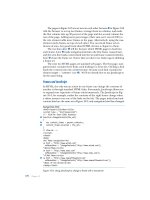Prosperity without growth foundations for the economy of tomorrow, 2nd edition
Bạn đang xem bản rút gọn của tài liệu. Xem và tải ngay bản đầy đủ của tài liệu tại đây (2.82 MB, 278 trang )
PROSPERITY
WITHOUT
GROWTH
What can prosperity possibly mean in a world of environmental and
social limits?
The publication of Prosperity without Growth was a landmark in the sustainability debate.
Tim Jackson’s piercing challenge to conventional economics openly questioned the most
highly prized goal of politicians and economists alike: the continued pursuit of exponential
economic growth. Its findings provoked controversy, inspired debate and led to a new
wave of research building on its arguments and conclusions.
This substantially revised and re-written edition updates those arguments and
considerably expands upon them. Jackson demonstrates that building a ‘post-growth’
economy is a precise, definable and meaningful task. Starting from clear first principles,
he sets out the dimensions of that task: the nature of enterprise; the quality of our
working lives; the structure of investment; and the role of the money supply. He shows
how the economy of tomorrow may be transformed in ways that protect employment,
facilitate social investment, reduce inequality and deliver both ecological and financial
stability.
Seven years after it was first published, Prosperity without Growth is no longer a radical
narrative whispered by a marginal fringe, but an essential vision of social progress in a
post-crisis world. Fulfilling that vision is simply the most urgent task of our times.
Tim Jackson is Professor of Sustainable Development at the University of Surrey, UK,
and Director of the Centre for the Understanding of Sustainable Prosperity (CUSP). For
seven years he was Economics Commissioner on the UK Sustainable Development
Commission, where his work culminated in the first edition of this book. He was awarded
the Hillary Laureate for exceptional international leadership in 2016. In addition to his
scientific work, Tim is a prize-winning dramatist with numerous radio writing credits for
the BBC.
Praise for the second edition of Prosperity without Growth
‘It is hard to improve a classic, but Jackson has done it… a clearly written yet scholarly
union of moral vision with solid economics.’
Herman Daly, author of Steady-State Economics
‘I remember exactly where I was when I first read Prosperity without Growth. It cuts
through the intellectual clamour with clarity, courage – and hope.’
Naomi Klein, author of This Changes Everything:
Capitalism vs. The Climate
‘Tim Jackson’s Prosperity without Growth systematises and renders tangible an essential
project few believed to be practical: recovering the dream of shared prosperity and
human development through decoupling it from the bandwagon of growth. Essential
reading for those refusing to succumb to a dystopic future.’
Yanis Varoufakis, Professor of Economics, University of Athens
‘One of the most important essays of our generation: both visionary and realistic, rooted
in careful research and setting out difficult but achievable goals, it gives what we so badly
need – an alternative to passivity, short-term selfishness and cynicism.’
Dr Rowan Williams, 104th Archbishop of Canterbury, UK
‘This challenge to the prevailing growth-based economic paradigm confronts an
inescapable dilemma: how to reconcile “our aspirations for the good life with the
limitations and constraints of a finite planet”. Its thoughtful and penetrating critique is
enriched by an outline of credible programs to achieve this end. A very valuable
contribution to urgent concerns that cannot be ignored.’
Noam Chomsky, Institute Professor &
Professor of Linguistics, MIT, USA
‘With much of the world in turmoil, calling for higher economic growth is every politician’s
comfort blanket of choice. But Tim Jackson compellingly urges those politicians to give up
their comfort blanket, to re-think our continuing dependence on economic growth, and to
start preparing – urgently – for a world where such growth is no longer viable as its
environmental cost massively exceeds its benefits. Prosperity without Growth remains the
single most important book addressing this most critical of contemporary challenges.’
Jonathon Porritt, Founder Director of Forum for the Future
‘Tim Jackson spearheads the obvious truth that GDP growth is not necessary in order to
achieve higher well-being in the rich world. Government intervention can produce the
desired result, namely full employment, less inequity and reduced greenhouse gas
emissions.’
Jørgen Randers, author of 2052: A Global
Forecast for the Next Forty Years
‘Tim Jackson has brought his groundbreaking book bang up to date and substantially
deepened its arguments. This extensively revised edition sets out more clearly than ever
the dimensions of a new and different economics – working for people, planet and
prosperity. There isn’t a better exposition out there of why and how we need to move
beyond growth.’
Caroline Lucas, MP for Brighton, Pavilion
Praise for the first edition of Prosperity without Growth
‘Bold and provocative.’
The New York Times
‘One of the most outstanding pieces of environmental economics literature in recent
years.’
Le Monde
‘One of the best books of 2009.’
Financial Times
‘A new movement seems to be emerging, and this superbly written book should be the
first stop for anyone wanting a manifesto … In terms of a worldview for the new decade
and beyond, this could well be the most important book you will read.’
The Guardian
‘In a world of massive inequality and limited resources, Tim Jackson asks the
fundamental questions of what prosperity really is and how we can invest not just in
material goods but in each other. This is an outstandingly intelligent and creative
contribution to debate.’
Dr Rowan Williams, former Archbishop of Canterbury
‘The question of whether progressives should abandon growth or continue a champion it
remains unresolved. But attempts to short- circuit that debate by dismissing de-growth as
“pie-in-the-sky” now face the demanding task of refuting this impressive work. I look
forward to Tim Jackson’s further elaboration of it.’
David Choat, Policy Progress blog
‘On a planet with finite resources, perpetual growth is not only impossible, but it is
endangering the survival of present and future generations. I urge everyone to read Tim
Jackson’s brilliant and visionary book. He offers a detailed critique of the existing
economic paradigm, and makes compelling suggestions for a shared and lasting
prosperity.’
Bianca Jagger, Founder and Chair,
Bianca Jagger Human Rights Foundation
‘In the teeth of the economic crisis, Jackson has written the most important book that
could possibly be written now.’
James Gustave Speth, author of The Bridge at the Edge of the World
‘This might well become as important for sustainable development as the Brundtland
Report.’
Paul-Marie Boulanger, Director of Institut
pour le Développement Durable (IDD)
‘Prosperity without Growth’s hugely encouraging and thrilling theme is that humanity can
prosper without growth. In fact there is no other way left to us.’
Dr Robert Goodland, former Adviser to the World Bank Group
‘Tim Jackson’s book simply resets the agenda for Western society.’
Bernie Bulkin, former chief scientist, BP
‘Jackson’s cutting edge research has already begun to re-define the debate about how to
achieve a future of human and planetary well- being. A must-read.’
Juliet Schor, author of Plenitude: The New Economics of True Wealth
‘The best account of the financial crisis and the state of society I have read in a long time
… The beauty is that the change that is needed will make us happier.’
Clare Short, UK Secretary of State for
International Development 1997–2003
‘Zero growth is not only necessary, it is inevitable and will supercede Selfish Capitalism.
In this brilliant analysis, Tim Jackson lays bare a system in crisis and lights the way
forward.’
Oliver James, author of Affluenza
‘A vital, much-needed, and timely work that deserves to be widely read, this is more than
a brilliant treatise on the difficulties of developing a truly sustainable economy. It is also
an important contribution to the increasingly urgent debate over the nature of the good
life and the good society.’
Colin Campbell, Emeritus Professor of Sociology,
University of York
‘Provokes official thought on the unthinkable. No small accomplishment!’
Herman Daly, author of Steady-State Economics
‘What makes it unthinkable to stop growth even though it is killing us? Tim Jackson boldly
confronts the structural Catch-22 that drives this madness and proposes in this lucid,
persuasive, and blessedly readable book how we might begin to get of the fast track to
self- destruction. Don’t miss it!’
Dianne Dumanoski, author of The End of the Long Summer
‘Tim Jackson cuts through the official cant and wishful thinking to tell us what we have
refused to admit we cannot preserve a habitable planet and pursue endless economic
growth at the same time. In an era when all ideologies have failed, this book lays out the
basis for the only viable political philosophy for the 21st century.’
Clive Hamilton, author of Growth Fetish
‘Endless growth on a finite planet, or endless misery-spreading recession, both represent
impossible futures. Here are some very powerful steps towards a possible, indeed a very
hopeful, alternate outcome!’
Bill McKibben, author of Deep Economy
‘Prosperity without Growth says it all: informatively, clearly, inspiringly, critically and
constructively, starting from the very troubled, unsustainable and unsatisfying economy
we have today and providing a robust combination of suggestions for going toward a
sustainable economy and fulfilling lives.’
Richard Norgaard, University of California, Berkeley
‘Tim Jackson’s book is a powerful intellectual challenge to an economic orthodoxy out of
touch with the real world of physical limits, global warming and peaking oil reserves. It is
refreshingly rigorous, honest and hopeful.’
Ann Pettifor, author of Just Money
‘When it comes to resolving the tension between the environment and the economy the
watchword should be “less is more”. If you want to find out how we could all be healthier,
wealthier and a lot wiser you should read this book.’
Molly Scott Cato, MEP
‘We live in a finite world but with infinite demands. Human wants, political convenience
and intellectual inertia trump planetary limits. Tim Jackson makes headway in setting
signposts towards a more sustainable future.’
Camilla Toulmin
‘This is one of the most brilliant analyses I’ve seen. It is a thoughtful and action-oriented
masterpiece, with an eye open to how to overcome resistance to the task ahead.’
Arnold Tukker, Professor of Industrial Ecology, Leiden University
‘It’s easy to lament the unsustainable nature of growth economics. It’s slightly harder to
re-imagine it on the other side. Hardest of all is to detail the transition, how you get from
growth to a steady state without breaking the economy. That’s the missing piece, and
Tim Jackson has boldly stepped into the breach with a book that is clear, balanced and
free of political bias … Prosperity without Growth has got to be one of the most important
books of the year.’
Jeremy Williams, Make Wealth History
‘[Tim Jackson] has done us a tremendous service in putting the debate into practical and
comprehensible language … This book will be a widely read and influential basis for
practical exposition of many of our underlying concerns and ideas for their solution to the
broader public.’
Ecological Economics
‘Jackson’s analysis is truly unique in meticulously disentangling the interdependencies
between the economic logic of production, the social logic of consumption, and the
conflicting position of the state that keeps the unsustainable machinery of growth
moving. Jackson also provides an original perspective that identifies leverage points for
change that hold the prospect of eventual effectiveness. I have not encountered such a
bright and insightful analysis since the path- breaking work of Donella and Dennis
Meadows and Herman Daly.’
Journal of Industrial Ecology
‘Prosperity without Growth gets my “twice read” honour … the book reads something like
a novel … Finally, I asked my wife Angie to read the book and summarise it for me. Her
conclusion? “This is a good book that will change your life. Read it.”’
Vinod Bhatia, JIE
‘I thought the book was splendid. Jackson’s writing is lucid and well organised. He has a
gift for the telling sentence.’
Bryan Walker, Hot Topic
‘[A] revolutionary text … whose time has come.’
George Monbiot, The Guardian
PROSPERITY
WITHOUT
GROWTH
FOUNDATIONS FOR THE ECONOMY OF TOMORROW
SECOND EDITION
TIM JACKSON
Second edition published 2017
by Routledge
2 Park Square, Milton Park, Abingdon, Oxon OX14 4RN
and by Routledge
711 Third Avenue, New York, NY 10017
Routledge is an imprint of the Taylor & Francis Group, an informa business
© 2017 Tim Jackson
The right of Tim Jackson to be identified as author of this work has been asserted by him in accordance with sections 77
and 78 of the Copyright, Designs and Patents Act 1988.
All rights reserved. No part of this book may be reprinted or reproduced or utilised in any form or by any electronic,
mechanical, or other means, now known or hereafter invented, including photocopying and recording, or in any information
storage or retrieval system, without permission in writing from the publishers.
Trademark notice: Product or corporate names may be trademarks or registered trademarks, and are used only for
identification and explanation without intent to infringe.
First edition published by Earthscan 2010
British Library Cataloguing in Publication Data
A catalogue record for this book is available from the British Library
Library of Congress Cataloging in Publication Data
Names: Jackson, Tim, 1957- author.
Title: Prosperity without growth : foundations for the economy of tomorrow / Tim Jackson.
Description: 2nd edition. | Abingdon, Oxon; New York, NY : Routledge, 2017. | Includes index.
Identifiers: LCCN 2016027418| ISBN 9781138935402 (hardback) | ISBN 9781138935419 (pbk.) | ISBN 9781315677453
(ebook)
Subjects: LCSH: Sustainable development. | Wealth. | Globalization--Economic aspects.
Classification: LCC HC79.E5 J298 2017 | DDC 338.9/27--dc23
LC record available at />ISBN: 978-1-138-93540-2 (hbk)
ISBN: 978-1-138-93541-9 (pbk)
ISBN: 978-1-315-67745-3 (ebk)
Typeset in Bembo and Scala Sans
by Saxon Graphics Ltd, Derby
This edition is dedicated to Zac, Tilly and Lissy: in recognition of the times when this book
took me from you; and in the hope that you will one day take something from it.
‘It’s your world now, use well the time. Be part of something good; leave something good behind.’
The Eagles (‘Long Road out of Eden’, 2007)
CONTENTS
LIST OF FIGURES
ACKNOWLEDGEMENTS
FOREWORD TO THE FIRST EDITION
PROLOGUE TO THE SECOND EDITION
1
The limits to growth
2
Prosperity lost
3
Redefining prosperity
4
The dilemma of growth
5
The myth of decoupling
6
The ‘iron cage’ of consumerism
7
Flourishing – within limits
8
Foundations for the economy of tomorrow
9
Towards a ‘post-growth’ macroeconomics
10 The progressive State
11 A lasting prosperity
NOTES
REFERENCES
INDEX
FIGURES
1.1
2.1
2.2
3.1
3.2
4.1
4.2
4.3
4.4
5.1
5.2
5.3
5.4
5.5
5.6
6.1
7.1
7.2
8.1
9.1
9.2
10.1
Global Commodity Price Index, 1992–2015
US government debt and private sector credit, 1955–2015
Productivity growth in advanced economies, 1950–2015
Income per capita and the Genuine Progress Indicator (GPI)
Subjective wellbeing (SWB) and income per capita
Life expectancy at birth and income per capita
Under-5 mortality rate and income per capita
Mean years of schooling and income per capita
Life expectancy through times of economic crisis
Annual carbon dioxide emission intensities, 1965–2015
Annual carbon dioxide emissions by world region, 1965–2015
Carbon dioxide emissions in richer and poorer nations, 1965–2015
The material footprint of OECD nations, 1990–2014
Global trends in resource production, 1990–2014
Carbon dioxide intensities: now and required to meet carbon targets
The ‘engine of growth’ in market economies
UK household debt and savings ratios, 1990–2016
An evolutionary map of the human heart
Greenhouse gas intensity v. employment intensity across sectors
The rise and fall of UK labour productivity growth
The stabilising role of countercyclical public spending
The health and social benefits of equality
ACKNOWLEDGEMENTS
I owe a huge debt of gratitude to the many people who generously gave me their help
and support during the writing of this book: both in the original and in the revised
editions.
The initial idea for the book came from a conversation I had with Jonathon Porritt, who
was for ten years chair of the Sustainable Development Commission (SDC). Shortly after I
was appointed as Economics Commissioner to the SDC in 2004 he and I sat down
together to discuss what my role in the commission might be.
We met in a café in Westminster, both of us rushing between other engagements. It
was a very short meeting, maybe twenty minutes at most. But it established the course
of my work for over a decade. His support for a report that would challenge the
foundations of the prevailing economic paradigm was immediate and unwavering. To this
day, I continue to benefit immensely from his insight and experience.
Equally vital was the camaraderie of colleagues at the Commission both during the
writing and after publication. Commissioners and secretariat alike gave generously of
their time, attending workshops, offering critical commentary and reviewing drafts for me.
Victor Anderson, Jan Bebbington, Bernie Bulkin, Lindsey Colbourne, Anna Coote, Peter
Davies, Stewart Davis, Sue Dibb, Sara Eppel, Ian Fenn, Ann Finlayson, Tess Gill, Alan
Knight, Tim Lang, Andrew Lee, Andy Long, Alice Owen, Elke Pirgmaier, Alison Pridmore,
Anne Power, Hugh Raven, Tim O’Riordan, Rhian Thomas, Jacopo Torriti, Joe Turrent, Kay
West and Becky Willis were amongst those who provided a constant source of
encouragement and advice, throughout this time.
Special thanks are owed to those who contributed directly to a series of workshops on
prosperity hosted by the Commission between November 2007 and April 2008.
Contributors included: Simone d’Alessandro, Frederic Bouder, Madeleine Bunting, Herman
Daly, Arik Dondi, Paul Ekins, Tim Kasser, Miriam Kennet, Guy Liu, Tommaso Luzzati,
Jesse Norman, Avner Offer, John O’Neill, Tom Prugh, Hilde Rapp, Jonathan Rutherford, Jill
Rutter, Zia Sardar, Kate Soper, Steve Sorrell, Nick Spencer, Derek Wall, David Woodward
and Dimitri Zenghelis.
The thesis in this book has been informed immeasurably by the warm collaboration I
have enjoyed over the last decade with numerous academic friends and colleagues. It is
a particular privilege to have led three large research collaborations at the University of
Surrey during the time this work was progressing. The Research Group on Lifestyles,
Values and the Environment (RESOLVE), the Sustainable Lifestyles Research Group
(SLRG) and most recently the Centre for the Understanding of Sustainable Prosperity
(CUSP) have provided the intellectual foundation through which so much of my
understanding has been forged.
My personal thanks are owed to numerous colleagues at the University of Surrey and
elsewhere who participated in and supported these projects. Alison Armstrong, Tracey
Bedford, Kate Burningham, Phil Catney, Mona Chitnis, Ian Christie, Alexia Coke, Geoff
Cooper, Will Davies, Rachael Durrant, Andy Dobson, Angela Druckman, Birgitta
Gatersleben, Bronwyn Hayward, Lester Hunt, Aled Jones, Chris Kukla, Matt Leach, Fergus
Lyon, Scott Milne, Yacob Mulugetta, Kate Oakley, Ronan Palmer, Debbie Roy, Adrian
Smith, Steve Sorrell, Andy Stirling, Sue Venn, David Uzzell, Bas Verplanken and Rebecca
White are amongst those with whom I shared not just a common agenda but an
intellectual bond that was always open and fruitful, even when we disagreed on specifics.
Our research collaboration would not have been possible without the tireless and goodnatured assistance of our various support teams: Wendy Day, Marilyn Ellis, Claire
Livingstone and Moira Foster all deserve a mention. Particular thanks must go to Gemma
Birkett for her central role in managing what was at times a frankly impossible diary and
maintaining an unlikely calm in the face of various storms.
In the wake of the first edition, I received such widespread support from so many
colleagues and friends that it would be impossible to make mention of them all here.
People contacted me from the most unlikely places, and the warmth of their reception
remains a vital resource for me in setting this work in perspective
From the hospice manager who drew parallels between my critique of consumerism
and the challenge of those entering his care, to the Augustinian sister who wrote to me
about Thomas Aquinas’ views on the common good; from the economics professor who
thanked me for breaking a taboo he had never understood to the grandmother who in the
1960s already brought up her children in accordance with the principles of ‘living lightly’
on the earth; from the school kids and university students who invited me to give lectures
to the investment managers who were prepared to listen and change: these personal
responses probably meant more to me than the many thousands of academic pages
devoted to analysing and critiquing the limits of ‘decoupling’.
It would be remiss of me not to mention by name some at least of those whose
intellectual input has been indispensable in the six years since the first edition was
published. Amongst those with whom I shared ideas, platforms and time were: Charlie
Arden-Clarke, Alan Atkinson, Mike Barry, Nathalie Bennet, Catherine Cameron, Isabelle
Cassiers, Bob Costanza, Ben Dyson, Ottmar Edenhofer, Marina Fischer-Kowalski, Duncan
Forbes, John Fullerton, Ralf Fücks, Connie Hedegaard, Colin Hines, Andrew Jackson,
Giorgos Kallis, Astrid Kann Rasmussen, Roman Krznaric, Satish Kumar, Michael Kumhof,
Christin Lahr, Philippe Lamberts, Anthony Leiserowitz, Caroline Lucas, Joan Martinez-Alier,
Jacqueline McGlade, Dennis Meadows, Dominique Meda, Peter Michaelis, Meinhard
Miegel, Ed Milliband, Frances O’Grady, Kate Power, Fabienne Pierre, Paul Raskin, Kate
Raworth, Bill Rees, Johan Rockström, François Schneider, Petra Pinzler, Juliet Schor,
Thomas Sedlacek, Gerhardt Schick, Gus Speth, Achim Steiner, Pavan Sukhdev, Any
Sulistyowati, Adair Turner, Barbara Unmüßig, Adam Wakeling, Joan Walley, Steve
Waygood, Ernst von Weizsäcker, Anders Wijkman and Rowan Williams. It goes without
saying that their views have not always entirely coincided with mine. But their intellectual
passion has been such a tremendous resource that they deserve my sincerest thanks.
I am grateful to Tommy Wiedmann, Tomas Marques, Neeyati Patel, Janet Salem, Heinz
Schandl and colleagues at CSIRO, SERI and UNEP for their generous inputs to my revised
chapter on decoupling. It is interesting to reflect on how much has changed in this debate
during the last decade. When I think back on the struggle to pull together useful material
footprint data seven or eight years ago, it’s an extraordinary testament to an incredibly
valuable international research programme. Today, the arguments about the role of trade
in obscuring the resource dependencies of affluent nations are widely accepted, due in no
small part to this body of work.
I owe a very personal debt of gratitude to Peter Victor, whose intellectual
companionship has been a vital ingredient to my own development over the last seven
years and a source of inspiration for this second edition. That Peter and I should have
found common vision in developing a ‘post-growth’ macroeconomics was a real co-benefit
from his early participation in my SDC work. That we shared so many other common
interests was an unexpected bonus. Special thanks also to Peter’s wife, Maria Paez Victor,
whose quiet tolerance of our week-long conversations was interrupted only by her
deliciously incisive critiques of western capitalism.
I have been lucky enough to work with not just one but three separate editorial teams
during the production of Prosperity without Growth: first with Kay West, Rhian Thomas
and Andy Long at the SDC; second with Jonathan Sinclair-Wilson, Camille Bramall,
Gudrun Freese, Alison Kuznets and Veruschka Selbach at Earthscan; and now with Neil
Boon, Andy Humphries, Cathy Hurren, Rob Langham, Laura Johnson, Umar Masood, Adele
Parker and Nikky Twyford at Routledge. I owe them all sincere thanks for their expertise,
attention to detail and patient understanding.
Finally, I’d like to reflect an enduring gratitude to my partner Linda, whose personal
and professional support has sustained me immensely through the unanticipated
challenges of the last few years. I am particularly grateful for our shared delight in the
simple act of walking: along rivers, through woods, across valleys, up mountains. As
Satish Kumar once told me (I think he might have taken it from Nietszche), the very best
thoughts are those that arrive while you’re walking.
FOREWORD TO THE FIRST EDITION
How should we prosper? This is the simple question at the heart of Professor Jackson’s
lucid and remarkable account of the economics of sustainability in which he asks what it
might mean for us to live well within the limits of a finite planet.
One cannot deny that our industrialized techniques and mastery of science have bought
us enormous benefits. We live longer and healthier lives, with a diversity of opportunity
undreamed of only decades ago. Revolutions in agriculture, nutrition, healthcare, in
education, communication and information technology have all opened out our horizons
and made possible things that would simply have been unimaginable to our ancestors –
all kinds of benefits that no one would willingly forego.
It goes without saying that we surely have a moral duty to share these benefits with
those in the poorest parts of the world. There remains an urgent need to improve
nutritional health for the two billion people who are still chronically undernourished; to
increase access to fresh water for the one billion people who still have no access to safe,
uncontaminated water supplies; to provide decent livelihoods for those still struggling to
survive in rural sub-Saharan Africa, in parts of South East Asia, in the favelas of Latin
America. Prosperity without Growth acknowledges at the outset these overwhelming
development needs.
The question is, can we meet those needs by following the same path that has also
created such a disturbing situation, where we are already consuming the Earth’s
resources faster than Nature can replenish them? Unfettered consumerism comes at a
high price; one that the Earth is finding increasingly difficult to pay. The evidence is very
clear: modern progress depends inherently on the exploitation of the extraordinary
bounty of Nature; on the wealth of her natural resources, the stability of her climate, the
resilience of her ecosystems. But Her bounty is necessarily limited and we have failed to
respect those limits. We have taken Nature too much for granted, seemingly leaving her
out of the equation altogether as we pursue headlong our desire for convenience in
everything.
Professor Jackson seeks to examine whether today’s dominant, conventional economic
model can help the situation or whether it hinders our chances of establishing a more
balanced approach which sustains the Earth’s precious life-support systems in the long
term. In an effort to tackle the whole issue of full (environmental) cost analysis, I
established a project called Accounting for Sustainability which encourages businesses to
include in their accounting everything that counts by measuring everything that matters –
that is, Nature’s essential ‘capital contribution’.
Prosperity without Growth is both a radical and a challenging book, but its vision for a
shared and lasting prosperity conveys a message full of hope. It is a vision that deserves
to be considered seriously. The health of our ecosystems and, thereby, the future
prosperity of our children may well depend upon it.
PROLOGUE TO THE SECOND EDITION
Economists are tellers of stories and makers of poems.
D. McCloskey 1
On the evening of Friday 27 March 2009, a cold wind was blowing and a light drizzle was
falling as I walked home from work. It had been a long week and when my phone rang I
was tired enough to contemplate not taking the call. But I was also aware that a couple
of journalists were still trying to reach me to talk about my report for the UK Sustainable
Development Commission (SDC). It was due for release the following Monday.2
Prosperity without Growth? (I’ll come to the question mark in a moment) emerged from
a long-running inquiry I led for the SDC into the relationship between prosperity and
sustainability. At the heart of the inquiry was a very simple question. What can prosperity
possibly mean in a world of environmental and social limits?
The conventional view is that economic expansion will lead to rising prosperity. Higher
incomes mean a better quality of life. This equation seems both familiar and obvious. But
it’s also clear that, on a finite planet, there must be some limits to material expansion. A
rising population with insatiable material aspirations sits uneasily with the finite nature of
our earthly home.
In the face of those limits, we’re left with just two possibilities. Either we must
progressively squeeze the material content out of economic expansion, so that we can
continue to grow our economies without trashing the planet, or we must learn to find
prosperity without relying on economic growth to deliver it for us.3
Neither avenue is easy to deliver. Nor is the choice between them straightforward.
Counterfactuality obscures simple logic. Physics, economics, politics, sociology and
psychology all lay claim to aspects of the argument. Making sense requires a willingness
to question received wisdom and a determined effort to avoid familiar axioms. It also
relies on a degree of openness to the possibility of political and social change.
As I walked home that evening I was aware that what had emerged was a complex
story. It was also a contentious one. More than 60 years of postwar global policy had
insisted that economic size matters; that more is always better. To intimate that quality
is sometimes to be preferred over quantity is not exactly revolutionary. But to convey this
message was going to be tough at the best of times. And these were surely not the best
of times.
The week of our launch coincided with the second ever G20 summit, to be hosted in
London by the UK government. The informal aim of the summit was to reinvigorate the
economy in the wake of the worst financial crisis in modern history. A press release
politely questioning growth might not be the best way for a government commission to
win friends in high places.
This sensitivity wasn’t lost on us. From the moment we announced that we were to
undertake an inquiry into the relationship between growth and sustainability, scepticism
rained down on the Commission. I remember a public meeting where a Treasury official,
on hearing the news, stood up and accused us of wanting to ‘go back and live in caves’.
Faced with this sensitivity, choosing a title had already proven tricky. My fellow
Commissioners were all highly experienced, independent-minded people, not at all shy
about making their opinions heard when contentious issues were on the table. Support
for the arguments in the report had revealed a solidarity that was almost unprecedented
by the standards of our usual deliberations. But varying degrees of uneasiness attended
the title itself.
Without the question mark (as I originally proposed), Prosperity without Growth
announced a manifesto for change. But in a climate of fear it verged on being
inflammatory. Various alternatives were proposed. Could we qualify the word ‘growth’?
Would ‘beyond’ be safer than ‘without’? Could we live with a different title altogether –
something altogether less provocative? None of these suggestions was entirely
satisfactory.
The question mark offered a compromise. It had the virtue of softening the tone
without entirely dismissing the force of the inquiry. It was, in this form, an invitation to an
important debate, perhaps the most vital debate of our time, without actually prejudging
the outcome: is it possible to flourish as a society without relentlessly expanding the
economy? In the end, our departmental sponsors agreed to accept the compromise so
long as we first tested it out on one of the Prime Minister’s advisors.
It might seem strange that an arms-length Commission should go to such lengths to
appease the sensitivity of its paymasters. But that is realpolitik. If you want complete
independence, go publish commercially. If you want influence, you must occasionally
heed your sponsors. Clearly, that doesn’t necessarily mean simply saying what ministers
want to hear. But you should probably avoid waving too much red rag in front of political
bulls, if you value your role as advisors.
Our position as a ‘critical friend’ to the UK government relied on a kind of fragile trust
between advisor and advisee. At every stage in the writing of the report, we had
presented our findings and discussed the implications with the relevant government
departments. At this final stage of proceedings, we effectively gave the Prime Minister’s
office the power of veto over the title itself.
The answer that came back was reassuaring. I don’t think it matters what you call it,
the advisor told us. Good, we thought. Confident that we had followed due process, we
set about drafting our press releases, devising our PR strategy, briefing journalists;
conveying the subtleties of the debate so far as we could without taxing the impatience
of the media. This too is part of the machinery of policy advice.
By the time the phone rang on that wet March evening, all of this was more or less
behind me. And, aside from fielding the odd press inquiry, my weekend stretched quietly
ahead, a haven of relative calm before an early start the following Monday for an
interview on the BBC’s Today programme. I decided to take the call.
‘Number 10 has gone ballistic,’ barked a voice on the other end of the line. The tone
was hostile. It was clearly not the journalist I had been expecting, nor a message that I
had anticipated. But I recognised the caller immediately. It was the one person who, until
that point, had been our closest ally in government, a key political sponsor of the SDC,
and a keen supporter of the work that we had been doing. In the space of a few seconds,
it was clear all that had changed.
The deceptively simple answer of the Number 10 advisor had been just that: deceptive.
As it turned out, the advisor in question was on a plane to China at the moment
Prosperity without Growth? (with its conciliatory question mark) landed unheralded on the
Prime Minister’s desk. It was a matter of days before the G20 leaders convened in London
to ‘kick-start growth again’. ‘What on earth had we been thinking?’ roared our former ally.
It was a good question, in retrospect. Had we been naïve to suppose such fundamental
concerns could be raised with impunity? Possibly. Had we overlooked the ambiguity
inherent in the advice we received from Number 10? Evidently. Had we been precipitous
in settling on such a sensitive release date? Perhaps. There was clearly an element of
bravado involved in launching a report with such a title slap bang into the week of the
G20 meeting. But what is the point in having a strong political message and being too
timid to convey it to the people to whom it should matter?
Were we wrong to take on the g-word at all, in the context of the financial chaos with
which the G20 leaders were grappling? Absolutely not. The moment it stops being
permissible to question the fundamental assumptions of an economic system that is
patently dysfunctional is the moment political freedom ends and cultural repression
begins. It is also the point at which the possibilities for change are significantly, perhaps
decisively, curtailed.
Clearly this was not the view of Number 10. And there was little I could do at that late
hour to placate our rattled former ally. The embargo was for Monday morning. But the
report was already out there. Even if we had wanted it, there was no going back now. I
politely excused myself and continued on home. Later I did talk to a journalist. It was a
long, surprisingly enthusiastic conversation with a major broadsheet promising a frontpage story about the report.
Monday morning, 30 March, I was up at five thirty and shortly afterward on my way to
BBC studios at the University of Surrey for the Today programme interview. With the
word ‘ballistic’ still echoing in my mind, I remember wondering vaguely what kind of
wrath was about to be unleashed.
Once again my reflections were interrupted by a phone call. No angry voices this time,
just a simple message. The interview was cancelled. The producer apologised. An
important story had come up involving the Prime Minister’s own constituency of Kirkcaldy
and Cowdenbeath in Scotland. The programme would have to cover this story instead.
Perplexed but not unduly concerned, I made my way to my office on campus, where I
searched the morning news. Over the weekend, the government had announced that the
Dunfermline Building Society was to be broken up and sold. Despite resistance from the
Dunfermline board, who felt they were being sacrificed for expediency, a deal had been
rushed through under the provisions of a new Banking Act, passed explicitly to help
respond to the financial crisis.
The Bank of England would take on the failing assets and what remained was to be
bought by another bank. Job losses were probably inevitable. Some of them (it turned out
three and a half years later) would indeed be in Cowdenbeath, the Prime Minister’s
constituency. This was the story that had stolen our thunder.4
As the week wore on, what started out as a frustrating setback became first puzzling
and then frankly bizarre. There was no cover story in the enthusiastic major broadsheet.
No further pick-up from the Today programme. Nothing from any other radio or TV
station. No coverage anywhere, in fact. One oblique reference in an article about the
green stimulus was the sum total of the impact made by Prosperity without Growth? on
the national media in early April 2009.
*****
Seven years later, in the warm sunshine of a late May afternoon, I sit down to reflect on
the extraordinary journey from there to here. Looking back is always salutary. I’m
reminded of the eponymous narrator’s opening line in the film The Go Between. ‘The past
is another country,’ he says. ‘They do things differently there.’
That journey might never have started, I suppose, were it not for the internet. Between
an unwilling government and an unwitting media, Prosperity without Growth? seemed
destined simply to disappear into the void. But at some point following the eerie silence
of the ‘launch’, people began to download the report from the SDC website.
Before long, it had been downloaded more often than any other report in the
Commission’s history. Invitations to discuss and present the work began to trickle in. Not
from our government sponsors, sadly. Or even, at first, from predictable sympathisers.
The interest came instead from a curious mixture of somewhat unusual suspects.
Poverty campaigners, asset managers, faith groups, consumer organisations, theatre
managers, engineers, archbishops, diplomats, museums, literary societies and the
occasional member of royalty. The trickle very soon became a flood – one which, to this
day, has not really abated.
Six months after its abortive launch, a revised version of the SDC report was published
by Earthscan, a small independent publisher with a long-standing commitment to
ecological literature. Jonathan Sinclair Wilson, Earthscan’s managing director, had read
the SDC report shortly after it came out and saw its potential as a book much sooner than
I did.
His confidence was rewarded. Within a few weeks of publication, the first print run had
sold out and the first of what would soon become 17 foreign-language translations were
being negotiated. By early 2010, Prosperity without Growth was no longer a contentious
government report languishing under its sponsor’s disapproval, but an unexpectedly
popular book with a surprisingly receptive audience.
*****
One of the biggest surprises was the international appeal of the book. It may well have
been more popular abroad than it was at home. In France and Belgium it fed into the
lively debate that surrounded the publication of the Sarkozy Commission’s work on









